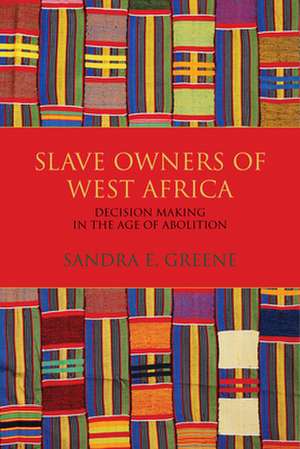Slave Owners of West Africa – Decision Making in the Age of Abolition
Autor Sandra E. Greeneen Limba Engleză Hardback – 21 mai 2017
| Toate formatele și edițiile | Preț | Express |
|---|---|---|
| Paperback (1) | 155.85 lei 6-8 săpt. | |
| MH – Indiana University Press – 21 mai 2017 | 155.85 lei 6-8 săpt. | |
| Hardback (1) | 441.86 lei 6-8 săpt. | |
| Wiley – 21 mai 2017 | 441.86 lei 6-8 săpt. |
Preț: 441.86 lei
Preț vechi: 573.85 lei
-23% Nou
Puncte Express: 663
Preț estimativ în valută:
84.56€ • 87.96$ • 69.81£
84.56€ • 87.96$ • 69.81£
Carte tipărită la comandă
Livrare economică 14-28 aprilie
Preluare comenzi: 021 569.72.76
Specificații
ISBN-13: 9780253025975
ISBN-10: 0253025974
Pagini: 138
Dimensiuni: 159 x 236 x 15 mm
Greutate: 0.36 kg
Editura: Wiley
ISBN-10: 0253025974
Pagini: 138
Dimensiuni: 159 x 236 x 15 mm
Greutate: 0.36 kg
Editura: Wiley
Notă biografică
Cuprins
Acknowledgements
Introduction
1. Amegashie Afeku of Keta: Priest and Political Advisor, Businessman and Slave Owner
2. Nyaho Tamakloe of Anlo: Of Chieftaincy and Slavery, of Politics and the Personal
3. Noah Yawo of Ho-Kpenoe: The Faith Journey of a Slave Owner
4. Concluding Thoughts
Notes
Bibliography
Index
Introduction
1. Amegashie Afeku of Keta: Priest and Political Advisor, Businessman and Slave Owner
2. Nyaho Tamakloe of Anlo: Of Chieftaincy and Slavery, of Politics and the Personal
3. Noah Yawo of Ho-Kpenoe: The Faith Journey of a Slave Owner
4. Concluding Thoughts
Notes
Bibliography
Index
Descriere
Knowing why these individuals and so many others in West Africa made the decisions they did, Greene contends, is critical to understanding how and why the institution of indigenous slavery continues to influence social relations in West Africa to this day.
